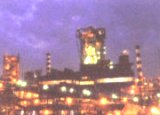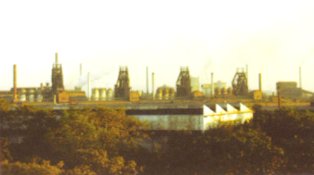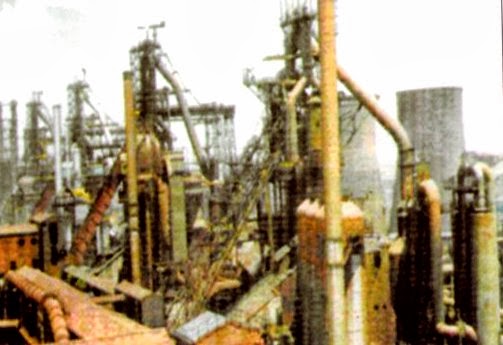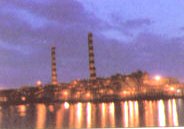19-Dec-2010
Indian Steel Industry
Steel is the backbone and crucial to the growth of modern economy. A country’s index of socio-economic development can be judged from the production and its per capita consumption of steel. That is why iron and steel industry is called a ‘Key Industry’. India is, most probably, the only country in the world bestowed with the two most important ingredients for making and selling steel – Raw Material (Iron ore) and Customers (Population) – and both of them in plenty. So, these days everyone is looking at India as the world’s next steel hub, be it the mighty foreign steel makers, India’s major ones or, the world’s renowned steel researchers and market watchers. It’s a unanimous voice that India is the country where one can make steel, of course, at a very competitive cost and sell it too and so, ‘additional-capacity-for-steel’ is the buzz word, be it the first generation producers or, the existing ones.
The Indian Steel Industry did remarkably well as compared to the rest of the world (with exception of China) during the recent difficult phase of the world economy. Even while the global production dipped by over 8% in 2009, the Indian Steel Industry registered a decent growth. In fact, Indian Steel Industry was the third fastest growing steel industry in the world next only to China. The demand for Indian steel was growing at 8-9% as against a global average of 5-6%. According to the Short Range Outlook of World Steel Association (WSA), India’s steel demand maintained stable growth during the recent crisis and is expected to grow by 13.9% and 13.7% in the years 2010 and 2011 respectively after a growth of 7.7% in 2009. During 2009-10 the steel production in India was 64.88 million tones, registering a growth of almost 11% from the previous year. New technologies like COREX and new sectors like colour coated steel, galvanizing steel have been introduced successfully.
According to Honorable Union Steel Minister of India, Shri Virbhadra Singh speaking at a National Media Conference held recently in India, the steel industry’s contribution to the country’s GDP is nearly 2% providing employment over 500000 (Five lakh) people. Currently, India is the world’s largest producer of sponge iron and third largest producer of crude steel after China and US. With a targeted production capacity of 124 million tones, then country is expected to become the second largest by 2015. With per capita steel consumption in India, at around only 45 kg, still being much lower than global averages, the opportunities for growth are immense. India’s steel use will reach 71.6 MT in 2011 according to the Short Range Outlook of World Steel Association.
The structure of the Indian Steel Industry can be divided into the following sectors:
Primary Producers The integrated steel plants (ISPs) who convert iron ore into steel through Coke oven-BF-BOF route e.g. SAIL (Steel Authority of India Ltd), RINL’s (Rashtriya Ispat Nigam’s) Vizag Steel Plant, all Public Sector units and Tata Iron and Steel Company (TISCO), which have among them nine operational units.
Secondary Producers The mini steel plants (MSPs), which make steel by melting, scrap iron or a mixture thereof in an Electric Arc Furnace (EAF) or an Induction Furnace (IF). At present there are about 190 Electric Arc Furnace (EAF) and 970 Induction Furnace (IF) in this sector in India.
Small Producers These include small scale stand alone processors making pig iron and sponge iron, hot and cold rolling units, re-roller units, galvanizing and tin plating units.
After the liberalization of the Indian steel sector in 1992, steel plants came up in a big way in the private sector. In the Private Sector, the private companies can be termed as corporations, sole proprietorships, business trusts while depending on their organizational know-how. In the Public Sector, the Public Companies are termed as corporations owned by the government while the ownership of possessions and concern is communal by the people. The importance regarding a public company is called its marketplace capitalization and the rising of funds is done throughout the retailing of its securities. Some examples of Public Sector steel plants are Steel Authority of India Ltd (SAIL), Rashtriya Ispat Nigam Limited (RINL), National Mineral Development Corporation Limited (NMDC), Metal Scrap Trade Corporation Limited (MSTC) and Bharat Refractories Limited (BRL), etc. while important steel plants in Private sector in India are such as Tata Iron and Steel Company (TISCO) or Tata Steel, JSW Steel, Bhushan Power and Steel Limited, Essar Steel, Jindal Steel and Power Limited (JSPL), etc.
According to the figures of JPC (Joint Plant Committee) report, the share of the private sector producers in India’s total gross production of carbon finished steel in 2001-02 was 67.5% which touched a level of 79% in 2009-10.
Year
|
Production
(in million tones per annum)
|
1950 – 51
1960 – 61
1970 – 71
1980 – 81
1990 – 91
1997 – 98
2004 – 05
2009 – 10
|
1.04
2.39
4.64
6.82
13.53
23.40
32.60
64.88
|
Public Sector Steel Plants
Steel Authority of India Ltd (SAIL) is the largest producer of iron and steel in India. With its commercial office in New Delhi SAIL produces iron and steel at five integrated steel plants:
1. Bhilai Steel Plant (BSP) at Bhilai, Chhattisgarh
2. Durgapur Steel Plant (DSP) at Durgapur, West Bengal
3. Rourkela Steel Plant at Rourkela, Orissa
4. IISCO Steel Plant (ISP) at Burnpur, West Bengal
5. Bokaro Steel plant (BSL) at Bokaro, Jharkhand.
Besides, SAIL has four special steel, alloy-steel plants:
1. Alloy Steels Plant (ASP) at Durgapur, West Bengal
2. Salem Steel Plant (SSP) at Salem, Tamil Nadu
3. Visvesvaraya Iron and Steel Plant (VISL) at Bhadravati, Karnataka
4. Maharashtra Elektrosmelt Limited, Chandrapur
Rourkela Steel Plant
The plants at Chandrapur and Bhadravati are subsidiaries of SAIL. These plants are located mainly in the eastern and central regions of India and situated close to domestic sources of raw materials, including the company’s iron ore, lime stone and dolomite mines. SAIL has distribution network across the country with 65 warehouses and network of dealers in all the districts of India. The IISCO-Ujjain Pipe and Foundry Company Limited, a subsidiary of IISCO, manufactures cast iron spun pipes at its works at Ujjain. Besides, Steel Authority of India Ltd. (SAIL) has seven central units –
=> Research and Development Center for Iron and Steel (RDCIS), Center for Engineering and Technology (CET), Management Training Institute, all located at Ranchi (Jharkhand)
=> Central Coal Supply Organization located at Dhanbad (Jharkhand)
=> Raw Materials Division, Growth Division, and Environment Management Division, all located at Kolkata (West Bengal)
The promotion of products of SAIL plants is done by the Central Marketing Organization, Kolkata (erstwhile Calcutta). Steel Authority of India Ltd. (SAIL) is in the process of modernizing and expanding its production units, raw material resources and other facilities to maintain its dominant status in the Indian Steel Industry. The company plans to increase its capacity and production by 70% by 2010-11 by spending 530 billion INR. Some other key objectives of SAIL’s expansion plan include –
=> 100 per cent production of steel through BOF (Basic Oxygen Furnace) route.
=> 100 per cent processing of steel through continuous casting method.
=> Adherence to energy saving schemes, environment norms etc.
=> Post-expansion production target of Hot Metal, Crude Steel, Saleable Steel 26.2, 24.6 and 23.1 million tones per annum respectively.
Bhilai Steel Plant
Rashtriya Ispat Nigam Limited (RINL) having its registered office as well as one integrated steel plant (VSP) at Vishakhapatnam. VSP is India’s primary shore-based public sector incorporated steel plant.
National Mineral Development Corporation Limited (NMDC) has its head office at Hyderabad. NMDC’s business is to increase mineral resources, with coal, oil, natural gas and atomic minerals. At present its actions are concerned on drawing out of iron ores and diamonds. National Mineral Development Corporation Limited (NMDC) operates computerized iron ore mines in India at Bailadila and Donimalai and diamond mines at Panna. Jammu and Kashmir Mineral Development Corporation Limited (J&KMDC) is a subsidiary company of NMDC, included for increase of various minerals in the state of Jammu and Kashmir.
Metallurgical and Engineering Consultants Limited (MECON) situated in the heart of Ranchi city provides all type of Consultancy and Engineering Services including design, lay-out, type of refractory lining etc. to both ferrous and non-ferrous metallurgical units.
National Mineral Development Corporation Limited
(NMDC) Plant
Kudermukh Iron Ore Company Limited (KIOCL) with its head office situated at Bangalore is the country’s 100% export oriented unit. It exports iron ore concentrate and pellets, both Blast Furnace and DR Grade, to many countries such as Japan, China, Indonesia, Iran, Turkey, Australia, and Taiwan etc.
Metal Scrap Trade Corporation Limited (MSTC) has its commercial office in Kolkata. It is engaged in introducing carbon steel melting scrap for Mini Steel Plants (MSPs) in the country. The company also undertakes the removal of ferrous and miscellaneous scrap arising from integrated steel plants under SAIL and RINL and disposal of scrap, surplus stores etc. from other public units and governments. Ferro Scrap Nigam Limited (FSNL) is a supplementary of MSTC (Metal Scrap Trade Corporation Limited) and undertakes the revival and dispensation of scrap from slag disposals of various steel plants.
Manganese Ore (India) Limited (MOIL) with its center of operations at Nagpur is the producer of Manganese ore in India. MOIL produces and sells all grades of manganese ore including high grade manganese ore required for the production of Ferro-Manganese, Blast Furnace grade ore required for the production of Hot Metal and Dioxide ore required for the production of dry battery cells.
Sponge Iron India Limited (SIIL) headquartered at Hyderabad was established as a display of Sponge Iron Plant to set up the techno-fiscal viability of producing sponge iron from lump iron ore and 100% non-coking coal. The plant is intended both for production of sponge iron and for Research and Development work.
Sector/Plant wise Production of Crude Steel in India
during 2009-10 and 2008-09 (‘000 tones)
|
Producers
|
Production during
|
Variance (%)
|
2009-10
(Provisional)
|
2008-09
|
Main Producers
|
Steel Authority of India (SAIL)
Bhilai Steel Plant
Durgapur Steel Plant
Rourkela Steel Plant
Bokaro Steel Plant
Indian I&E Steel Plant
Alloy Steel Plant
Salem Steel Plant
VISL
|
5108
1966
2128
3599
400
205
0
103
|
5183
1886
2083
3577
417
168
0
95
|
– 1.4
4.2
2.2
0.6
– 4.1
22.0
-
8.4
|
Total SAIL Plants
|
13509
|
13409
|
0.7
|
RINL (VSP)
|
3205
|
2963
|
8.2
|
Tata Steel
|
6563
|
5646
|
16.2
|
Total Main Producers
|
23277
|
22108
|
5.7
|
Major Secondary Producers
|
JSWL
|
5257
|
3218
|
63.4
|
ISPAT Industries
|
2689
|
2201
|
22.2
|
Essar Steel
|
3474
|
3342
|
3.9
|
JSPL
|
1961
|
1457
|
34.6
|
Total Major Secondary Producers
|
13381
|
10218
|
31.0
|
Other Producers
|
28217
|
26201
|
7.7
|
Grand Total Production
|
64875
|
58437
|
11.0
|
Source: JPC (Joint Plant Committee) report
Private Sector Steel Plants
Tata Steel or Tata Iron & Steel Company (TISCO) located at Jamshedpur is the oldest integrated steel plants in India having started its production in February 1912.

It is the flagship company of Tata Sons one of the best-known symbols of India’s industrial development. Tata Steel is exporter of lofty quality and worth added steel products. Tata Steel’s products comprise of HR coils, tubes, rods, bars, structural, strips, sheets and bearings. Tata Steel (TISCO) is incorporated with actions ranging from mining of raw materials to finished steel products. Following its new acquisitions, Tata Steel is now a multinational one having operations in many countries. Its Jamshedpur plant contains the DCS supplied by Honeywell while having its registered office in Mumbai, the so-called business capital of India. Tata Steel launched the world’s first branded C.R product in the name of “Tata Steelum”. Tata Steel’s world-class Cold Rolling Mill Complex at Jamshedpur has given a new dimension in the production of Cold-Rolled steel to India.
JSW Steel is one of the largest incorporated private steel producers in India so far the provision of capacity is concerned. JSW Steel has a wide range of products which include pellets, slabs, HR coils/sheets, HR plates, CR coils, galvanized coils/sheets, and colour coated coils/sheets. In fact JSW Steel is one of the principal manufacturers of cold rolled, galvanized, and colour coated steel with its developed service facilities at Vasind and Tarapur near Mumbai in Maharashtra. The company is working hard to achieve the target capacity of manufacturing around 32 million tones of steel per annum.
Jindal South West Steel Limited formerly known as Jindal Vijayanagar Steel Plant (JVSL) had opted for the COREX – BOF route for producing HR Coils. The COREX process of VAI, Austria (now Siemens VAI) has low emission levels and helps in the generation of medium calorific value export gas offering a clean source of power. The plant is situated at Torangallu in Karnataka had an initial capacity of 1.6 million tones per year (MTPA), which has been expanded to 6.6 MTPA.
Jindal Steel and Power Limited (JSPL) is the largest coal-based producer of sponge iron in
Asia and the second in the world. JSPL’s plant situated at Raigarh in Chhattisgarh was the first producer of longest finished rails in the world. It is also producing hot-rolled parallel flange beams and columns as well as Larsen U-type piles for the first time in India.
Essar Steel Limited is another India - based leading steel producer in private sector in India as well as in some other countries. Essar Steel is fully integrated from mining to retail and has strong downstream capability with a global retail capacity in excess of 3 million tones per annum (MTPA). Essar Steel has in its basket many customized products catering to a variety of product segments. It is also India’s largest exporter of flat products to the US and European markets, and to those of South East Asia and the Middle East countries. Hazira Steel Complex near Surat (Gujarat) and Vishakhapatnam Pellet Complex are some manufacturing units of Essar Steel in India. It is the largest steel producer in western India with a capacity of 10 MTPA at Hazira Steel Complex having a complete infrastructure setup including a captive port, lime plant and oxygen plant. The Vishakhapatnam Pellet Complex has a capacity of 8 MTPA while Essar Steel possesses an 8 MTPA beneficiation plant at Bailadila and the world’s largest capacity Hot Briquetted Iron (HBI) plant with MIDREX technology at Hazira (later integrated it with DC–EAF and hot strip rolling mill with a capacity of around 5 MTPA). Essar Steel has recently acquired all the assets of Shree Precoated Steel Limited (SPSL) of Pune in India. The capacity of Shree Precoated Steel Limited (SPSL) Colour Coated Line is 400000 TPA (ton per year), of Cold Rolling Mill is 600000 TPA of Galvanizing Mill is 500000 TPA, and of Pickling Line 650000 TPA. With aggressive expansion plans in India, as well as Asia and the US, Essar Steel has a target to achieve a capacity of 14 MTPA by 2011-12.
[Essar Steel starts second Conarc Furnace].
Bhushan Power and Steel Ltd. having head office in New Delhi is a manufacturer of flat, round and long products as well as value added products having a whole steel value chain ranging from coal mining, billets, HR coils, pig iron, CR coils, GP/GC, precision tubes, black pipe/GI pipe, cable tapes, tor steel, wire rod and special alloy steel.
Bhushan Steel and Strips Ltd. has a state-of-the-art 6-Hi Universal Crown Mill supplied by Hitachi of Japan and the process know-how is also from Sumitimo of Japan with auto shape control. Bhushan Steel and Strips Ltd. is producing CR coils up to 1600 mm width at its Shahibabad plant is one of the leading suppliers of Cold-Rolled products to India’s automotive industry.
Ispat Industries Limited has installed the world’s first MEGAMOND Midrex unit and later integrated it with a unique technology of utilizing DRI (Direct Reduced Iron) and BF (Blast Furnace) hot metal as metallic charge in its Twin-shell CONARC EAF (Electric Arc Furnace) followed by thin slab casting and strip rolling with SMS Demag (now SMS Siemag) technology of Germany. Ispat’s plant at Dolvi near Mumbai had an initial capacity of 1.2 MTPA which has been expanded to 3.6 MTPA. Ispat was the first Indian steel producer with thin slab casting facilities and was the country’s first producer of colour coated sheets.














.png)







